| |
| |
| |
| Presented By Facebook |
| |
| Axios AM |
| By Mike Allen ·Dec 21, 2020 |
| ❄️ Good Monday morning — and welcome to winter, which officially starts today. - Today's Smart Brevity™ count: 1,181 words ... 4½ minutes.
🔮 "This is Axios Events 2020" ... Today at 12:30 p.m. ET, please join our podcast maestros — "Axios Today" host Niala Boodhoo and "Axios Re:Cap" host Dan Primack — for a year-end show from Axios Virtual Events, spotlighting some of the best of 2020. |
| |
| |
| 1 big thing: Dual realities could harden in 2021 |
 |
|
| Illustration: Sarah Grillo/Axios |
| |
| The U.S. and world economies are in a state of gross divergence, creating winners' and losers' brackets, Dion Rabouin writes in Axios Markets: - Why it matters: The pandemic accelerated shifts in the economic makeup of the U.S. and the world, and those trends will be further cemented in 2021.
The economy and stock market are diverging: - The Nasdaq's 42% rise year to date in the face of a U.S. economy expected to contract by 3% is the most jarring example yet. But economic growth has been softening for years as equity prices — especially for Big Tech — have boomed.
Credit markets are diverging: - For large public companies with access to debt markets, credit is cheap and widely available.
- Credit from banks to smaller businesses and individuals, however, remains historically elusive and expensive.
The fortunes of young and old are diverging: - Higher housing costs mean more equity and higher resale values for homeowners, but also higher rent. Similarly, advances in health care mean older people are living longer and able to accrue the benefits of rising asset prices rather than passing them on to the next generation.
- That directly benefits older Americans largely at the expense of younger ones, who are moving out of large metros like New York and L.A. on the coasts and toward places like Phoenix and Denver that still offer vibrant cultural life but lower rent.
- The median age of U.S. homebuyers rose from 31 in 1981 to 47 in 2019.
💰Sign up for Dion Rabouin's daily Axios Markets. |
    |
| |
| |
| 2. Inside the long-delayed COVID relief package |
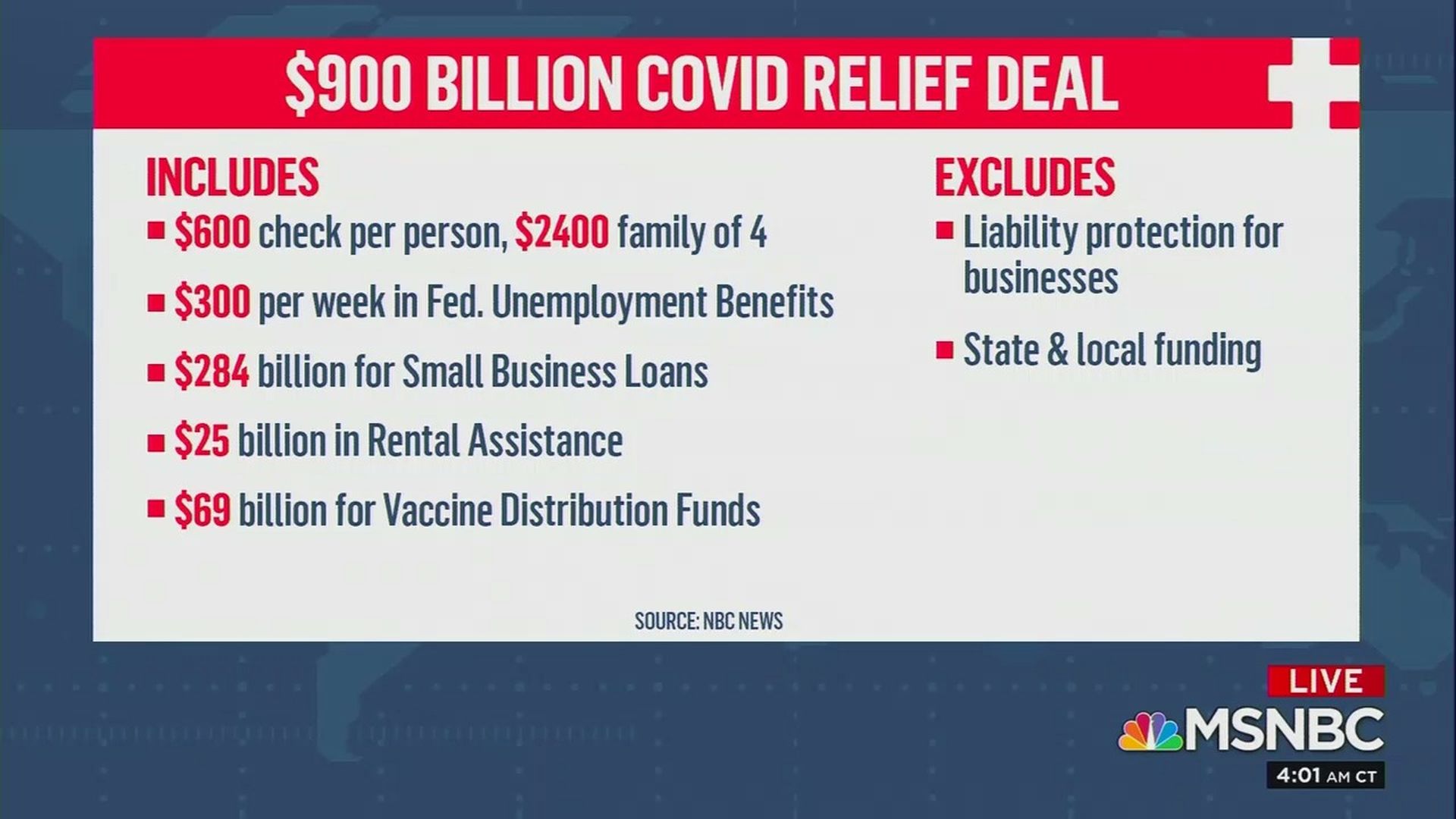 |
|
| Graphic: MSNBC's "Way Too Early" |
| |
| Democratic leaders say they view the deal, to be voted on as soon as today, as a "starter" package until President-elect Biden takes office and can pass more stimulus, Axios' Alayna Treene and Oriana Gonzalez report. - Some lawmakers, including progressives, are skeptical Biden will be able to do this as easily as Democrats are projecting.
Photo: Jose Luis Magana/AP What's in the package, via AP: - Provides $600 direct payments to individuals making up to $75,000 per year and couples making $150,000 per year — with payments phased out for higher incomes — with $600 additional payments per dependent child.
- Unemployment insurance: Revives supplemental federal pandemic unemployment benefits but at $300 per week — through March 14 — instead of the $600 per week benefit that expired in July.
- Extends special pandemic benefits for "gig" workers and extends the maximum period for state-paid jobless benefits to 50 weeks.
- Revives the Paycheck Protection Program, which provides forgivable loans to qualified businesses. Especially hard-hit businesses that received PPP grants would be eligible for a second round.
- Provides $25 billion for a first-ever federal rental assistance program — funds to be distributed by state and local governments to help people who have fallen behind on their rent and may face eviction.
- Surprise medical billing: Protects consumers from huge surprise medical bills after receiving treatment from out-of-network providers.
More highlights. |
    |
| |
| |
| 3. Widespread vaccine mandates unlikely |
 |
|
| Illustration: Annelise Capossela/Axios |
| |
| The early vaccine rollout has sparked speculation about a system of "immunity passports" — proving you've been vaccinated in order to send your kids to school, go back to work or get on a plane. But that probably won't happen, at least in the short term, health care editor Sam Baker writes. - Experts generally agree that vaccines won't be mandatory in almost any setting until they receive full FDA approval, which won't happen until next year.
- Limited supplies make mandates untenable: You can't force someone to get a shot that's not available.
More broadly, many of the institutions that could require proof of vaccination simply may not want to. - Struggling businesses aren't likely to set up new restrictions.
- Employers could require their workers to get vaccinated. But that would be controversial, and employees can seek religious exemptions. For now, more big companies are opting to encourage or facilitate voluntary vaccinations.
Exceptions: Health care facilities have long required workers to get other vaccines, including flu shots. - Nursing homes might also want to explore mandatory vaccinations, said Ashish Jha, dean of public health at Brown University.
- And universities could begin requiring proof of vaccination for students who want to live on campus.
Public schools — the most familiar source of vaccine mandates, and the biggest battleground for debates over those policies — probably won't require coronavirus vaccinations any time soon. - Neither the Pfizer nor the Moderna vaccine has been tested or authorized for use in children yet.
- Kids are at low risk for serious illness from the virus.
- But this could all be revisited by the time the next school year starts.
Share this story. |
    |
| |
| |
| A message from Facebook |
| It's time to update internet regulations |
| |
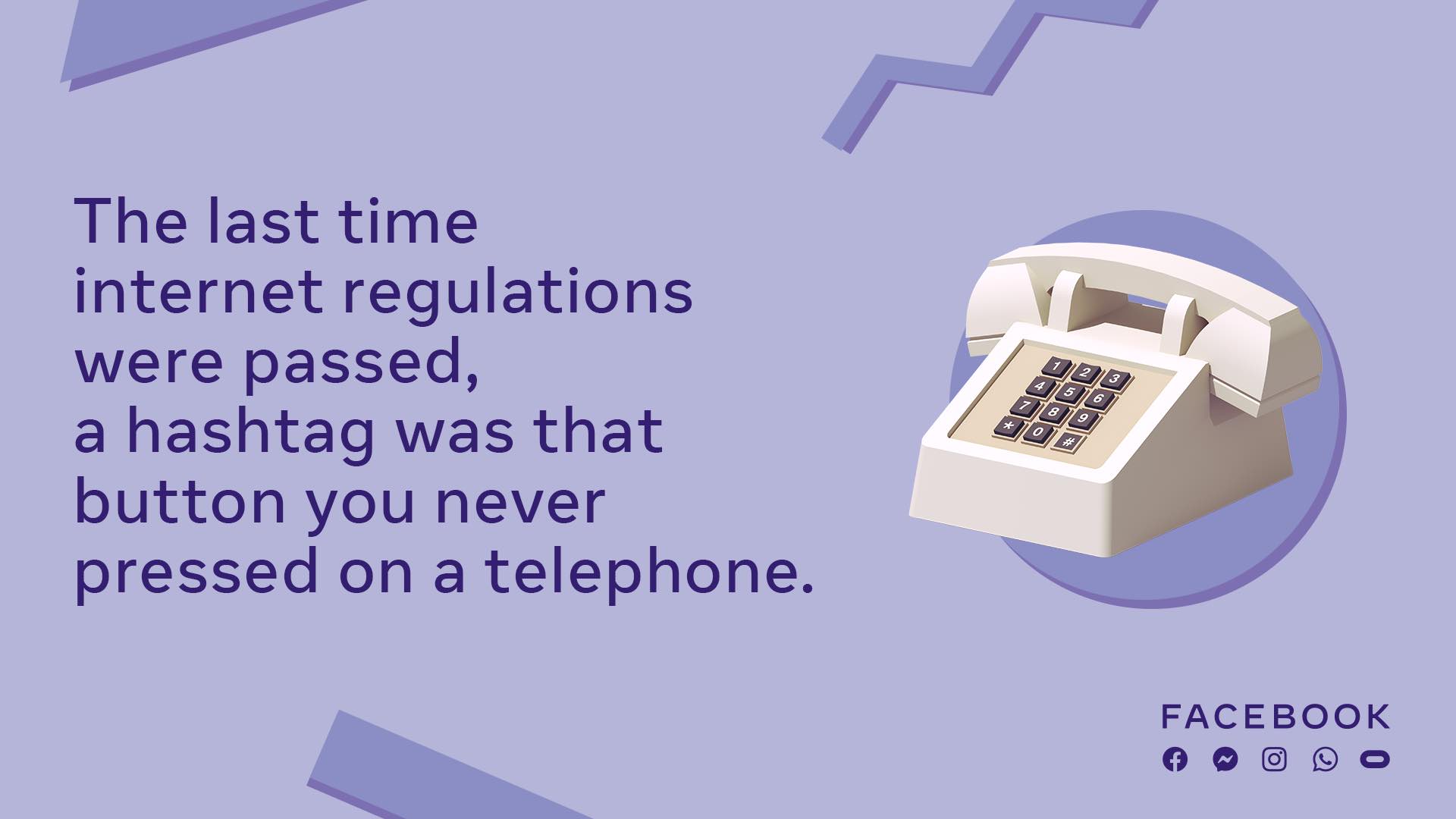 |
| |
| The internet has changed a lot in 25 years. But the last time comprehensive internet regulations were passed was in 1996. We want updated internet regulations to set clear guidelines for addressing today's toughest challenges. Learn More |
| |
| |
| 4. Pic du jour |
 |
|
| Photo: Bruce Bennett/Getty Images |
| |
| On Long Island, a drone's-eye view of kayaks immersed in snow along the shore of Centerport, N.Y. (Suffolk County). |
    |
| |
| |
| 5. Klain: Biden will "degrade capacity" of foreign hackers |
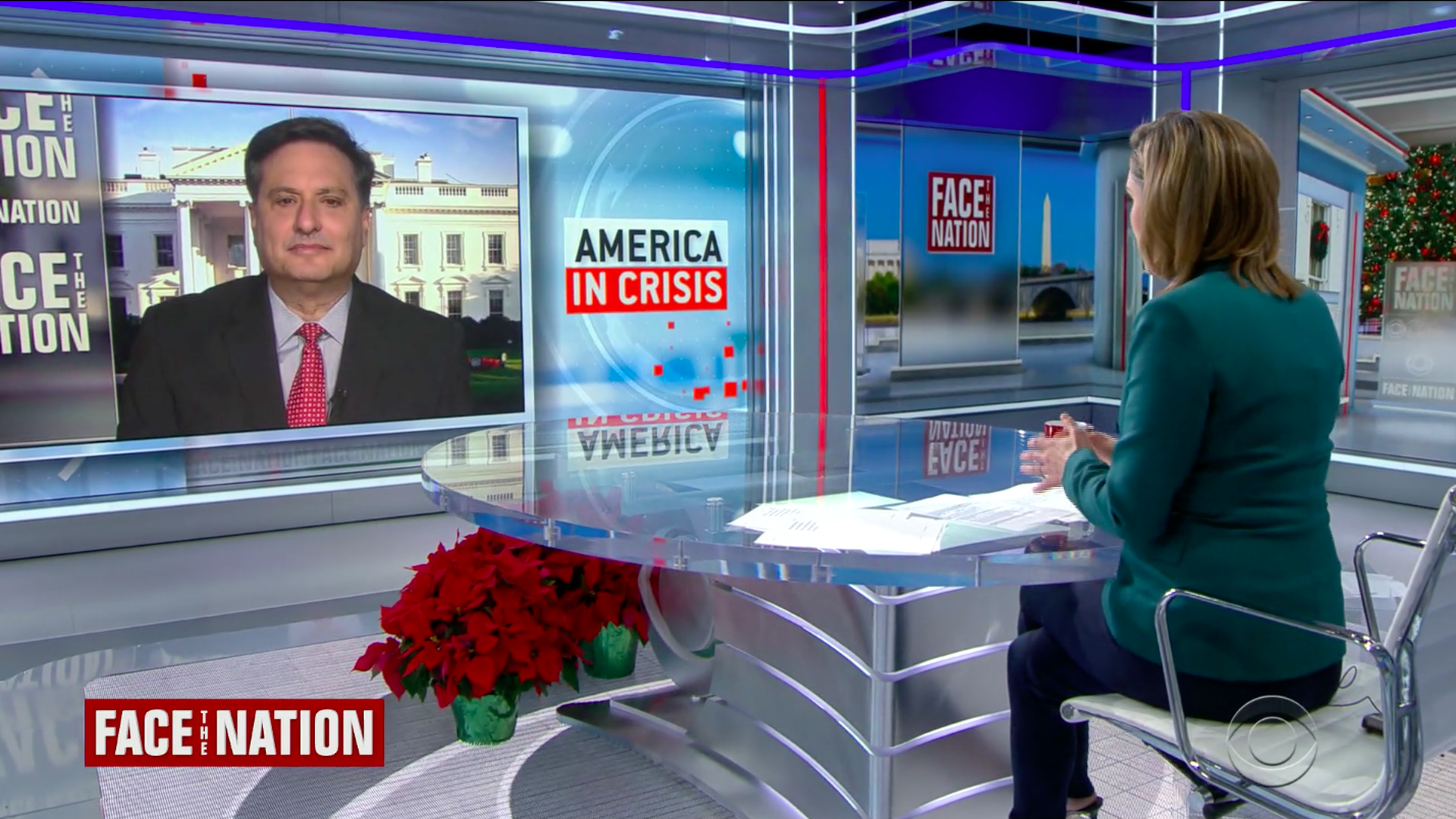 |
|
| CBS News |
| |
| With President Trump downplaying Russia's cyberattack, incoming White House chief of staff Ron Klain said on CBS' "Face the Nation" that the Biden administration would respond aggressively to "an attack like this": I want to be very clear it's not just sanctions. It's also steps and things we could do to degrade the capacity of foreign actors to repeat this sort of attack, or [we'll face] even more dangerous attacks. Video. |
    |
| |
| |
| 6. Kansas City Star to Black neighbors: "We are sorry" |
| The editor of the Kansas City Star, Mike Fannin, published a letter to readers yesterday apologizing for decades of racist coverage that "disenfranchised, ignored and scorned generations of Black Kansas Citians": [A] team of reporters ... dug deeply into the archives of The Star and what was once its sister paper, The Kansas City Times. They pored over thousands of pages of digitized and microfilmed stories, comparing the coverage to how those same events were covered in the Black press ... Reporters were frequently sickened by what they found — decades of coverage that depicted Black Kansas Citians as criminals living in a crime-laden world. They felt shame at what was missing: the achievements, aspirations and milestones of an entire population routinely overlooked. Keep reading. |
    |
| |
| |
| 7. 🎞️ Trump rewind: What we've lived through |
| President Trump speaks at an airport rally in Jacksonville on Sept. 24. Photo: Tom Brenner/Reuters Here's a freeze frame from AP's Jonathan Lemire, Zeke Miller and Darlene Superville, kicking off a Trump legacy series: - He went after the intelligence agencies and Justice Department — calling out leaders by name.
- He targeted the Supreme Court for insufficient loyalty and the Postal Service for its handling of mail-in ballots.
- He didn't release his tax returns or divest himself from his businesses.
- He used government property for political purposes, including the White House as the backdrop for his renomination acceptance speech.
- He used National Guard troops to clear a largely peaceful protest across from the White House for a photo-op.
- He cast doubt on once-inviolable alliances like NATO.
And that was all before his challenge to the peaceful transfer of power. |
    |
| |
| |
| 8. San Francisco's Cliff House closing after 157 years |
| Photo: Carleton Watkins/Royal Geographical Society via Getty Images The Cliff House — a neoclassical San Francisco restaurant perched above the Pacific — opened during the Civil War, and survived the earthquake of 1906. - But it has fallen to the pandemic and a squabble with its landlord, the National Park Service, the S.F. Chronicle reports (subscription).
180 employees will lose their jobs. - Last call for an establishment that dates to 1863: Dec. 31, 2020.
Above, horse-drawn carriages outside Cliff House in 1869. - Below, a similar view in 2013 — 144 years later.
Photo: Justin Sullivan/Getty Images Go deeper: Explore Cliff House history. |
    |
| |
| |
| 9. Wild read: Reporter gave up marriage for jailed "Pharma Bro" |
| In a delicious read for Elle, former Bloomberg reporter Christie Smythe tells Stephanie Clifford — a former N.Y. Times reporter she knew from the pressroom of Brooklyn federal court — about her imprisoned "life partner," Martin Shkreli: I don't know if everything he was saying was true, but maybe like 1 percent is, and that's awesome on its own. Keep reading. |
    |
| |
| |
| 10. 1 fun thing: College football's four-team finale |
 Graphic: Axios Visuals College football's most unpredictable season ends with the most predictable lineup of powerhouses imaginable, Kendall Baker writes in Axios Sports. |
    |
| |
| |
| A message from Facebook |
| Internet regulations need an update |
| |
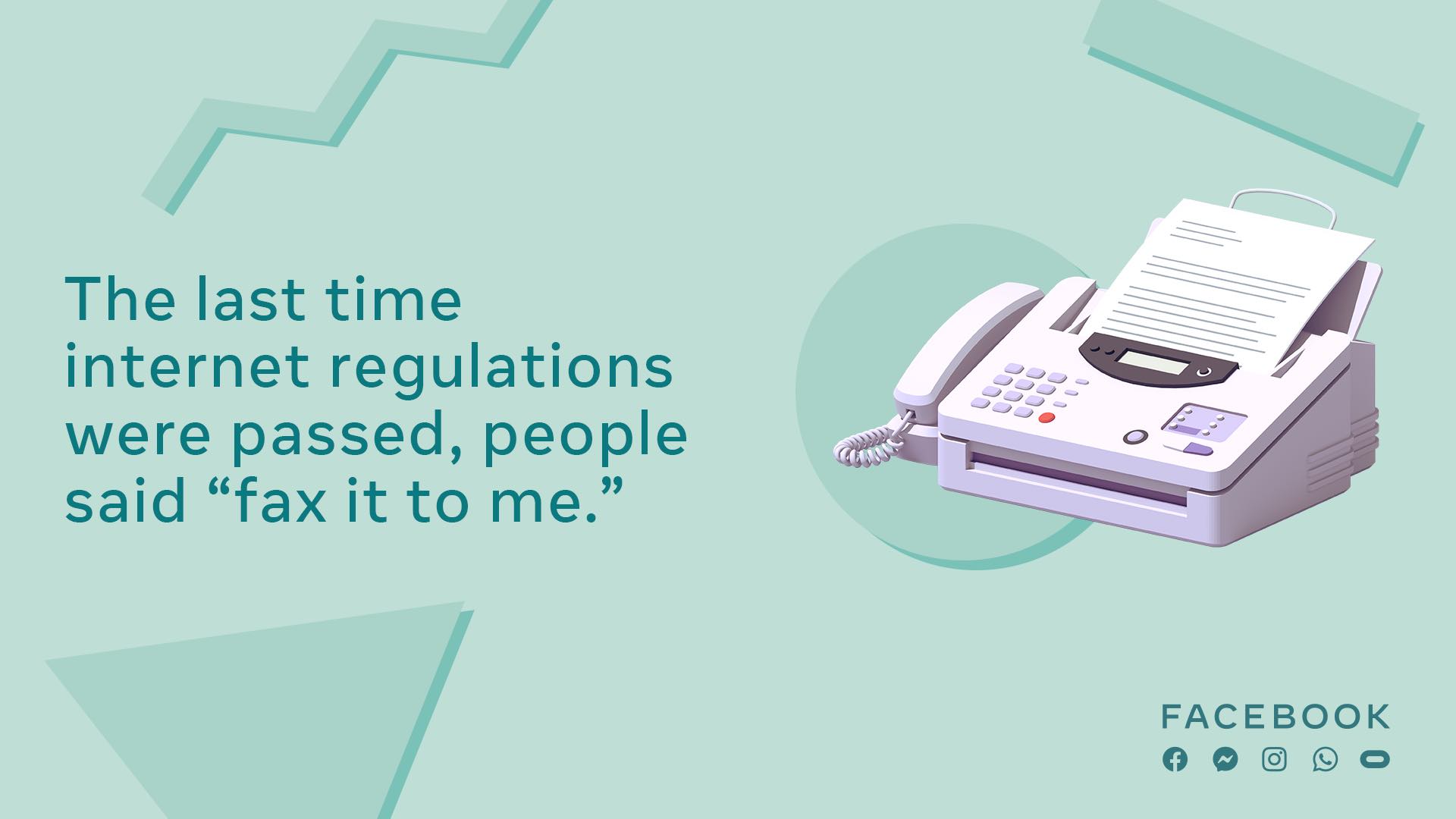 |
| |
| It's been 25 years since lawmakers passed comprehensive internet regulations. But a lot has changed since 1996. We want updated regulations to set clear guidelines for protecting people's privacy, enabling safe and easy data portability between platforms and more. Learn More |
| |
| 📬 Thanks for starting your holiday week with us. Please invite your friends to sign up for Axios AM/PM. |










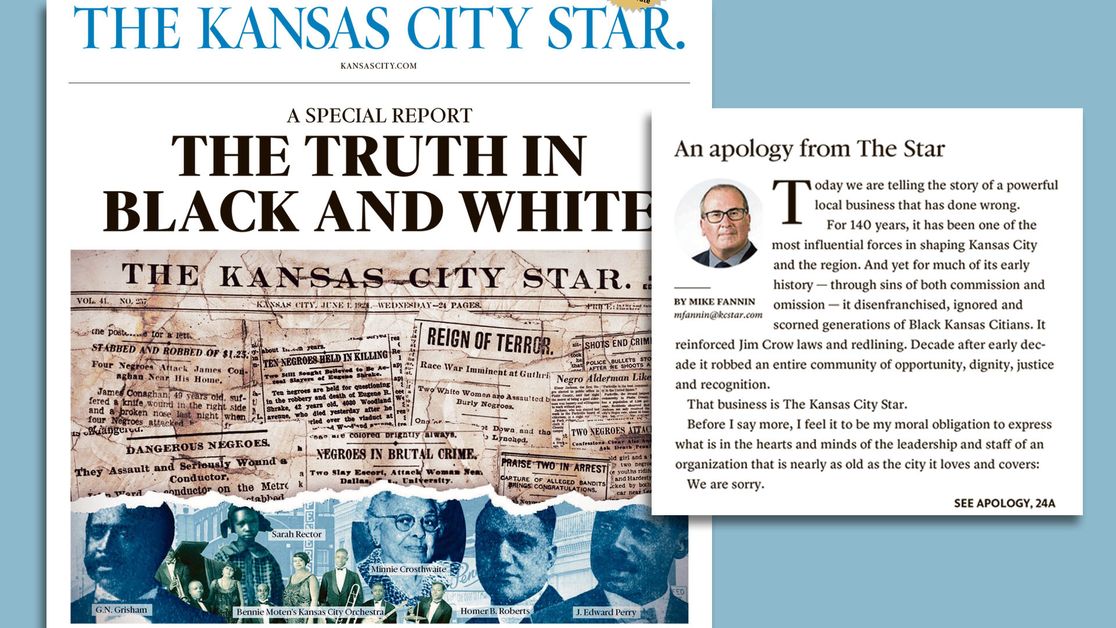
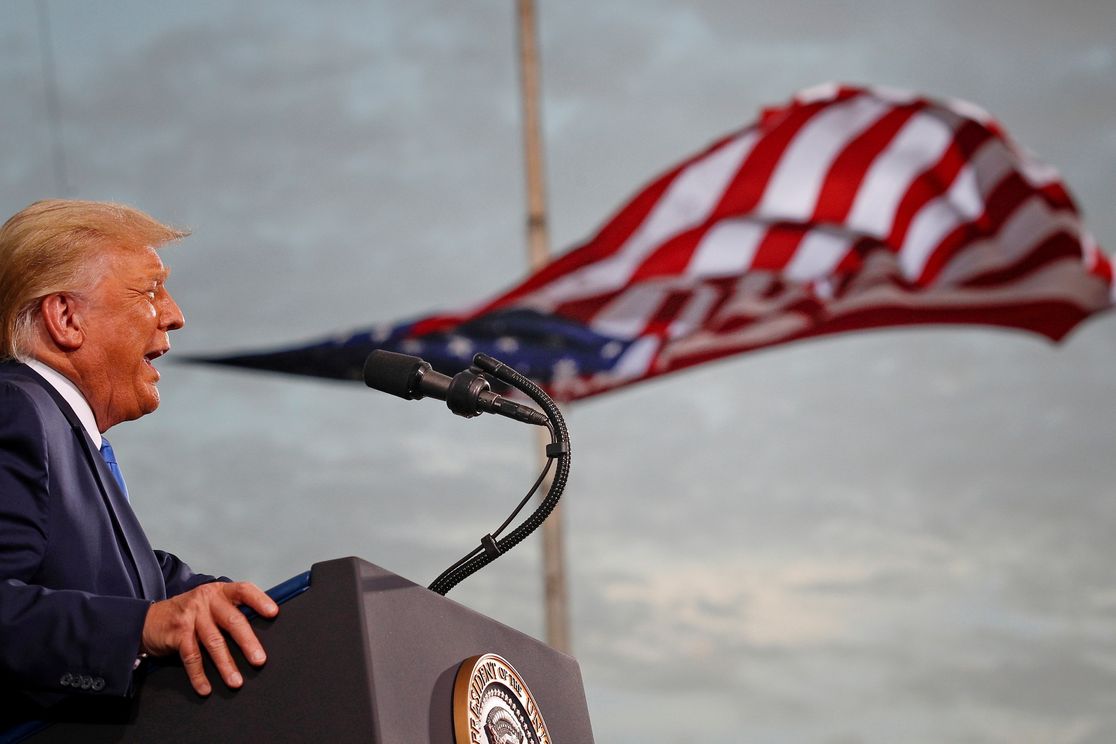

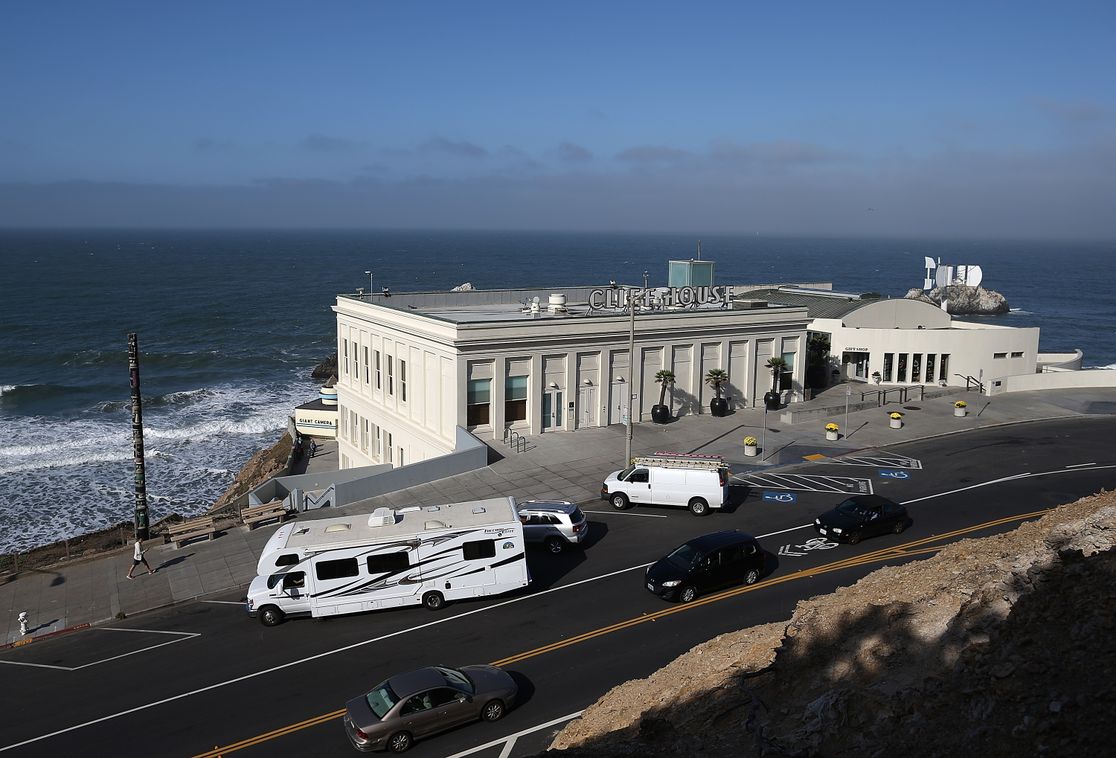


No comments:
Post a Comment